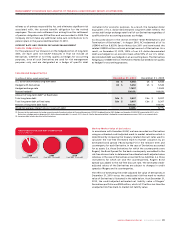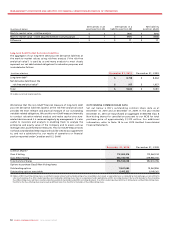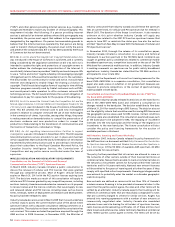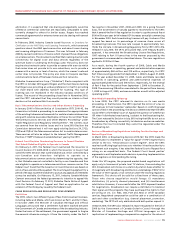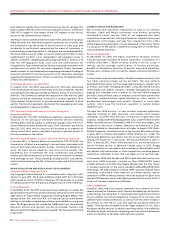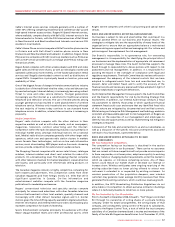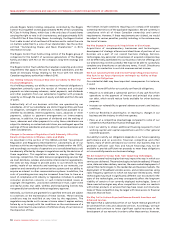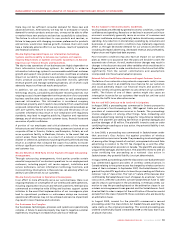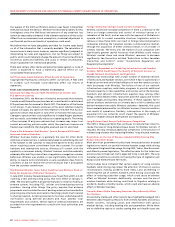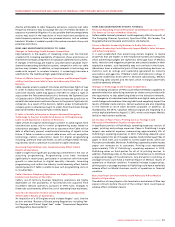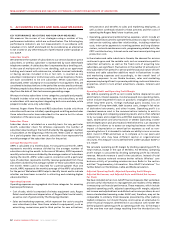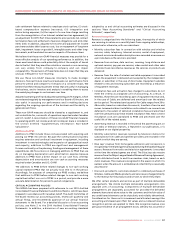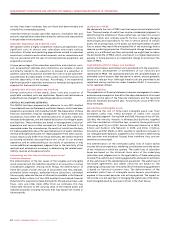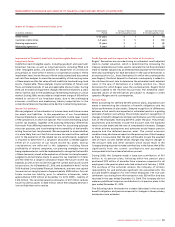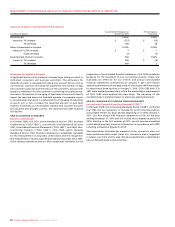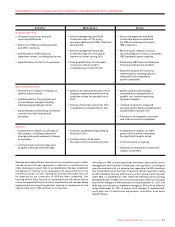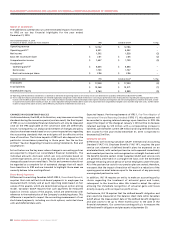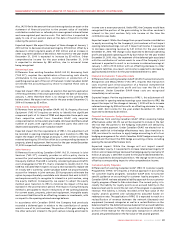Rogers 2010 Annual Report Download - page 55
Download and view the complete annual report
Please find page 55 of the 2010 Rogers annual report below. You can navigate through the pages in the report by either clicking on the pages listed below, or by using the keyword search tool below to find specific information within the annual report.
ROGERS COMMUNICATIONS INC. 2010 ANNUAL REPORT 59
MANAGEMENT’S DISCUSSION AND ANALYSIS OF FINANCIAL CONDITION AND RESULTS OF OPERATIONS
there may not be sufficient consumer demand for these new and
advanced services. Alternatively, we may fail to anticipate or satisfy
demand for certain products and services, or may not be able to offer
or market these new products and services successfully to subscribers.
The failure to attract subscribers to new products and services, or
failure to keep pace with changing consumer preferences for products
and services, would slow revenue growth, increase churn and could
have a materially adverse effect on our business, results of operations
and financial condition.
We Are Highly Dependent Upon our Information Technology
Systems and the Inability to Enhance our Systems or Prevent a
Security Breach (Data or System) or Disaster Could Have an Adverse
Impact on our Financial Results and Operations.
The day-to-day operations of our businesses are highly dependent on
their information technology systems. An inability to enhance
information technology systems to accommodate additional customer
growth and support new products and services could have an adverse
impact on our ability to acquire new subscribers, manage subscriber
churn, produce accurate and timely subscriber invoices, generate
revenue growth and manage operating expenses, all of which could
adversely impact our financial results and position.
In addition, we use industry standard network and information
technology security, survivability and disaster recovery practices. Our
ongoing success is in part dependent on the protection of our corporate
business sensitive data including our customers’ as well as employees’
personal information. This information is considered company
intellectual property and it needs to be protected from unauthorized
access and compromise for which we rely on policies and procedures as
well as IT systems. Failure to secure our data and the privacy of our
customer information may result in non-compliance with regulatory
standards, may lead to negative publicity, litigation and reputation
damage, any of which may result in customer losses, financial losses and
an erosion of public confidence.
A portion of our employees and critical elements of the network
infrastructure and information technology systems are located at our
corporate offices in Toronto, Ontario, and Brampton, Ontario, as well
as an operations facility in Markham, Ontario. In the event that we
cannot access these facilities, as a result of a natural or manmade
disaster or otherwise, operations may be significantly affected and may
result in a condition that is beyond the scope of our ability to recover
without significant service interruption and commensurate revenue
and customer loss.
We Are Reliant on Third Party Service Providers Through Outsourcing
Arrangements.
Through outsourcing arrangements, third parties provide certain
essential components of our business operations to our employees and
customers, including payroll, call centre support, installation and
service technicians, certain information technology functions, and
invoice printing. Interruptions in these services can adversely affect our
ability to provide services to our customers.
We Are Heavily Involved in Operational Convergence.
In an effort to more efficiently serve our customer base, there is an
ongoing emphasis on convergence of our wireless and cable operations,
including organization structure and network platforms. We have also
commenced an enterprise-wide billing and business support system
initiative. In the event that implementation of our convergence plans
lead to operational problems or unforeseen delays are incurred,
operational efficiencies may not be achieved and service impairment
may result in loss of revenue and customers.
Our Businesses Are Complex.
Our businesses, technologies, processes and systems are operationally
complex. A failure to execute properly may lead to negative customer
experiences, resulting in increased churn and loss of revenue.
We Are Subject to General Economic Conditions.
Our businesses are affected by general economic conditions, consumer
confidence and spending. Recessions or declines in economic activity or
economic uncertainty generally cause an erosion of consumer and
business confidence and may materially reduce discretionary consumer
spending. Any reduction in discretionary spending by consumers and
businesses or weak economic conditions may materially negatively
affect us through decreased demand for our products and services
including decreased advertising, decreased revenue and profitability,
higher churn and higher bad debt expense.
Poor economic conditions may also have an impact on our pension
plans as there is no assurance that the plans will be able to earn the
assumed rate of return. As well, market-driven changes may result in
changes in the discount rates and other variables which would result in
Rogers being required to make contributions in the future that differ
significantly from the current contributions and assumptions
incorporated into the actuarial valuation process.
Network Failures Could Reduce Revenue and Impact Customer Service.
The failure of our networks or key network components could, in some
circumstances, result in an indefinite loss of service for our customers
and could adversely impact our financial results and position. In
addition, we rely on business partners to carry certain of our customers’
traffic. The failure of one of these carriers might also cause an
interruption in service for our customers that would last until we could
reroute the traffic to an alternative carrier.
We Are and Will Continue to Be Involved in Litigation.
In August 2008, a proceeding was commenced in Ontario pursuant to
that province’s Class Proceedings Act, 1992 against Cable and other
providers of communications services in Canada. The proceedings
involve allegations of, among other things, false, misleading and
deceptive advertising relating to charges for long-distance telephone
usage. The plaintiffs are seeking $20 million in general damages and
punitive damages of $5 million. The plaintiffs intend to seek an order
certifying the proceedings as a class action. Any potential liability is not
yet determinable.
In June 2008, a proceeding was commenced in Saskatchewan under
that province’s Class Actions Act against providers of wireless
communications services in Canada. The proceeding involves allegations
of, among other things, breach of contract, misrepresentation and false
advertising in relation to the 911 fee charged by us and the other
wireless communication providers in Canada. The plaintiffs are seeking
unquantified damages and restitution. The plaintiffs intend to seek an
order certifying the proceeding as a national class action in
Saskatchewan. Any potential liability is not yet determinable.
In August 2004, a proceeding under the Class Actions Act (Saskatchewan)
was commenced against providers of wireless communications in
Canada relating to the system access fee charged by wireless carriers to
some of their customers. In September 2007, the Saskatchewan Court
granted the plaintiffs’ application to have the proceeding certified as a
national, “opt-in” class action. The “opt-in” nature of the class was later
confirmed by the Saskatchewan Court of Appeal. As a national, “opt-in”
class action, affected customers outside Saskatchewan have to take
specific steps to participate in the proceeding. In February 2008, our
motion to stay the proceeding based on the arbitration clause in our
wireless service agreements was granted and the Saskatchewan Court
directed that its order in respect of the certification of the action would
exclude from the class of plaintiffs those customers who are bound by
an arbitration clause.
In August 2009, counsel for the plaintiffs commenced a second
proceeding under the Class Actions Act (Saskatchewan) asserting the
same claims as the original proceeding. This second proceeding was
ordered conditionally stayed in December 2009 on the basis that it was
an abuse of process.


